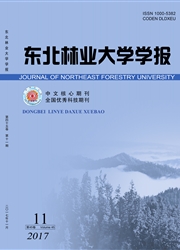

 中文摘要:
中文摘要:
将采自福建武夷山自然保护区黄冈山系3个海拔高度的黄山松种子置于恒温发芽箱中于25℃条件下发芽,待种子长成幼苗后拔出幼苗,置于冰箱中0~5℃寒冷处理24h后,测定5个生理生化指标处理前后的变化情况。采用多重复测定,检测了这些指标随海拔高度的变化关系。发现幼苗浸出液相对电导率、超氧化物歧化酶活性及丙二醛质量摩尔浓度在低温处理下,均表现出随海拔高度的增加而降低的规律。这些指标与黄山松的海拔适应性存在相关,可用于临域性物种分化机理的研究。
 英文摘要:
英文摘要:
Pinus taiwanensis seeds,collected from different elevations of Huanggang Mountain in Wuyi Nature Reserve,were cultivated in a container at 25 degrees C. After sprouting,the seedlings were stored in a refrigerator within a temperature range of 2 ~5 degrees C for 24 hours. Five physiological and biochemical indices of P. taiwanensis seedlings were determined before and after the treatment,and the variation trends of these indexes with increasing elevation were also studied. Three of the tested indices,including relative electrical conductivity of extract fluid,SOD activity,and MDA content of the seedlings after low temperature treatment decreased with increasing elevation. Therefore,the above three indices are related to the adaptability of P. taiwanensis to elevation. These indices could be applied to explore the mechanism of parapatric speciation.
 同期刊论文项目
同期刊论文项目
 同项目期刊论文
同项目期刊论文
 Potential chromosomal introgression barriers revealed by linkage analysis in a hybrid of Pinus masso
Potential chromosomal introgression barriers revealed by linkage analysis in a hybrid of Pinus masso 期刊信息
期刊信息
